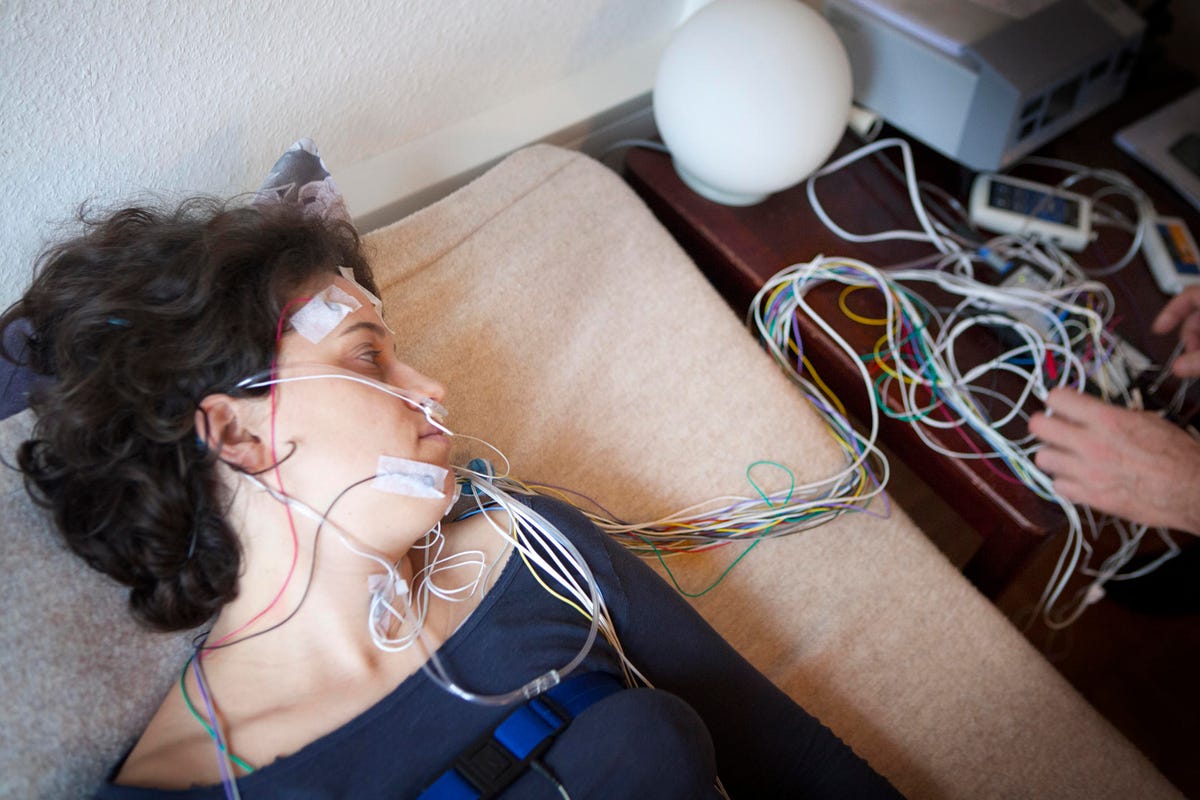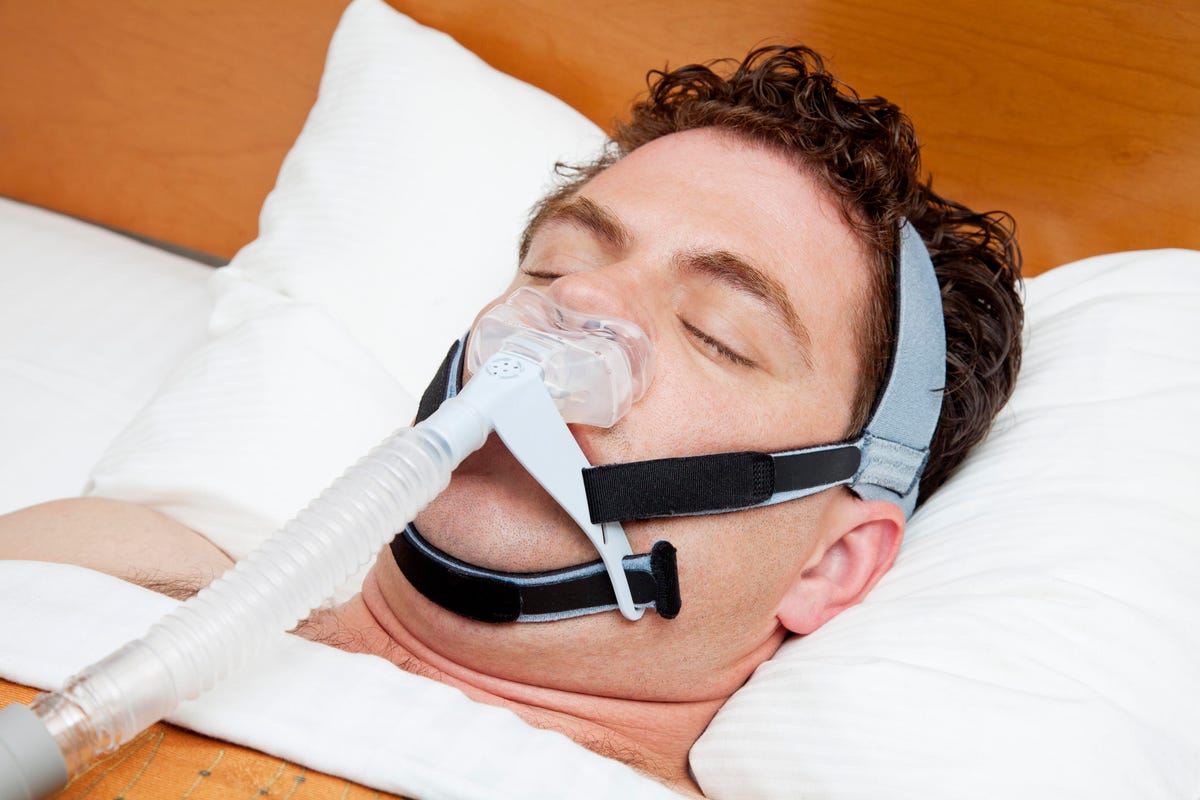Sleep apnea is a disorder that causes you to stop breathing momentarily while you're asleep. It can be scary, and if this experience sounds familiar, you're not alone. It's estimated that nearly 30 million adults in the US and 936 million adults globally have sleep apnea.
The good news is that sleep technology is continually advancing and improving. Apple's recent announcement about its new sleep apnea detection feature will soon be available on the Apple Watch Series 10, Series 9 and Ultra 2. This feature is expected to use an accelerometer to monitor breathing disruptions throughout the night. Although it won't diagnose you, it could help indicate if you should consult your doctor about the possibility of having sleep apnea.
This guide covers the different types of sleep apnea, its causes, risk factors and symptoms to help you better understand this disorder. You'll also learn how to seek a diagnosis and treatment options if you think you may have sleep apnea.
Different types of sleep apnea
There are three types of sleep apnea, and the way they manifest in your body is different. The end result is the same: all three deprive your body of oxygen.
- Obstructive sleep apnea is the more common form of sleep apnea that occurs when your throat muscles relax, blocking your lungs from receiving oxygen.
- Central sleep apnea is less common, and it occurs when your brain doesn't properly signal the muscles in your body that control breathing.
- Complex sleep apnea syndrome, also known as treatment-emergent central sleep apnea, is the least common of the three. This occurs when someone exhibits signs of both obstructive sleep apnea and central sleep apnea.
Watch: How To Get Better Sleep Using Technology
Symptoms of sleep apnea
Snoring is the most common symptom of sleep apnea, but snoring alone isn't always indicative of it. Snoring followed by silent pauses, gasping or choking sounds is likely a sign of sleep apnea.
Because sleep apnea wakes you up frequently throughout the night (even if you don't notice it), you can suffer from symptoms of sleep deprivation, such as daytime fatigue, difficulty concentrating, unintentional napping and irritability or mood swings.
Other symptoms include:
- Feeling tired, even when you thought you had a full night's sleep
- Insomnia or trouble falling asleep
- Headaches and migraines
- Loss of memory
- Decreased sex drive
- Nocturia (waking up at night to use the bathroom)

A common symptom of sleep apnea is feeling tired, even when you thought you had a full night's sleep.
AndreyPopov/Getty ImagesComplications of sleep apnea
When you have sleep apnea, your body is consistently deprived of oxygen throughout the night. This lack of oxygen can have negative long-term effects on your health.
Sleep apnea has been associated with:
- Hypertension (high blood pressure)
- Cardiovascular disease
- Stroke
- Diabetes
- Depression
- Metabolic syndrome
- Liver problems
Read more: Easy Ways to Improve Your Sleep Quality
Causes and risk factors of sleep apnea
An "apnea" is a temporary pause in breathing. In most cases, it's caused by tissue collapsing in the back of the throat (obstructive sleep apnea).
When you fall asleep, the muscles of your upper airway relax. This narrows your airway, making it hard for oxygen to reach your lungs. Gravity can exacerbate this narrowing if you sleep on your back because your tongue relaxes backward toward your throat.
Central sleep apnea is usually linked to other medical conditions, such as heart disorders and brain damage.
Many risk factors can influence one's likelihood of developing sleep apnea, the most common and significant being excess body weight.
Common risk factors for sleep apnea include:
- Excess weight: If you have a body mass index of 25 or higher, your risk for sleep apnea increases.
- Large neck circumference: Your risk for sleep apnea is higher if your neck measures 17 inches or more for men or 16 inches or more for women. This is because a larger neck has more tissue liable to collapsing during sleep.
- Age: Sleep apnea can affect people of any age, but it becomes more common when people reach young adulthood and middle age.
- Gender: More men get sleep apnea than women. For women, the risk of sleep apnea increases as they approach and go through menopause.
- High blood pressure: Hypertension and sleep apnea commonly coexist.
- Family history: If a family member has sleep apnea, your risk is higher because sleep apnea can be inherited.
- Alcohol use: Drinking alcohol before bed can cause your throat muscles to relax even further.
- Smoking: Smoking can increase inflammation in your airways.

To be diagnosed with sleep apnea, you might undergo a polysomnography test.
Amelie Benoist/BSIP/Getty ImagesIn most cases, doctors diagnose sleep apnea based on a careful physical exam, sleep evaluation and sleep history. You may not be able to provide a sleep history by yourself, but you can enlist the help of someone who shares your bed or room.
A sleep evaluation usually involves overnight monitoring at a sleep center, where machines measure your breathing and other body functions, such as your pulse, while you sleep. Sometimes, at-home sleep tests are an option. Tests that detect sleep apnea include:
- Nocturnal polysomnography: During this test, the equipment measures the activity of your heart, lungs and brain, as well as your breathing and movement patterns and blood oxygen levels while you sleep.
- Multiple sleep latency testing: An MSLT tests for excessive daytime sleepiness by measuring how quickly you fall asleep in a quiet environment during the day. It's often used to diagnose narcolepsy.
- Maintenance of wakefulness test: An MWT measures your ability to stay awake during the day by finding your sleep latency, or how long it takes you to fall asleep. Sleep latencies of less than eight minutes during the day are considered abnormal.
- Home sleep tests: At-home tests are usually simplified versions of nocturnal polysomnography that measure your heart rate, airflow, breathing patterns and blood oxygen levels.
In some cases, doctors refer patients to a sleep specialist or otolaryngologist (also known as an ear, nose and throat or ENT doctor) for further evaluation, which can include a nasal airflow test and an examination to rule out any blockages in your nose or ears.
Your doctor might also refer you to a cardiologist or neurologist to look for causes of central sleep apnea. A neurologist may conduct an electroencephalogram to measure brain waves and test for central sleep apnea, while a cardiologist can use an electrocardiogram, to rule out or confirm any heart complications.

CPAP masks are one of the most common ways to treat sleep apnea.
Alina Solovyova-Vincent/Getty ImagesHow to treat sleep apnea
There are a few ways to treat sleep apnea, and many people go through a series of trial treatments to determine what works best for them. Sometimes, it takes a series of trials to find the best treatment, and most people end up using a combination of common equipment, machines and therapies to get relief.
Treatment options for sleep apnea include:
Continuous positive airway pressure: Most people who seek treatment for sleep apnea start with CPAP. You choose a CPAP mask, which sends a pressurized airflow through your throat to open your airways while you sleep. If you use a CPAP, make sure to keep it clean.
Bilevel positive airway pressure: Similar to a CPAP, a BiPAP also provides a pressurized flow of air. The key difference is that it provides two different streams -- one as you breathe in and one as you breathe out.
Chinstrap: Usually used in conjunction with a CPAP, chinstraps help you to stop breathing through your mouth.
Oral appliances: If you don't have severe sleep apnea, you could try custom-fitted oral devices that help keep your airway open. Just make sure to get one from a qualified dentist or orthodontist, not a one-size-fits-all appliance from the internet.
Usually, your doctor won't recommend surgery unless all other options have failed to treat and improve your sleep apnea. Most doctors suggest at least a three-month trial of other options before recommending surgery, which can include nasal reconstruction (such as to fix a deviated septum) or removal of adenoids -- the soft tissue in the back of your throat.
Read more: How Sleep Apnea Affects Your Health